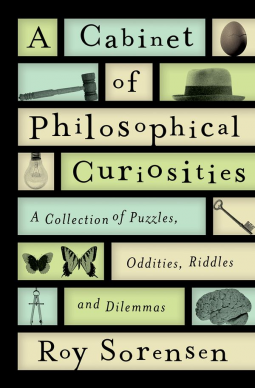
A Cabinet of Philosophical Curiosities
A Collection of Puzzles, Oddities, Riddles, and Dilemmas
by Roy Sorensen
This title was previously available on NetGalley and is now archived.
Buy on Amazon
Buy on Waterstones
*This page contains affiliate links, so we may earn a small commission when you make a purchase through links on our site at no additional cost to you.
Send NetGalley books directly to your Kindle or Kindle app
1
To read on a Kindle or Kindle app, please add kindle@netgalley.com as an approved email address to receive files in your Amazon account. Click here for step-by-step instructions.
2
Also find your Kindle email address within your Amazon account, and enter it here.
Pub Date 2 May 2016 | Archive Date 23 May 2016
Description
Will you answer this question in the same way that you will answer my next question? Done? Good!
Will you buy this book?. Inside you will discover that your only truthful answer to this second question is affirmative.
Logic has made some men rich. Inside this book you will learn of John Eck (who debated Luther in 1519). He Will you answer this question in the same way that you will answer my next question? Done? Good! Will you buy this book? Inside you will discover that your only truthful answer to this second question is affirmative.
A Cabinet of Philosophical Curiosities is a colorful collection of puzzles and paradoxes, both historical and contemporary, by philosopher Roy Sorensen. Taking inspiration from Ian Stewart's Professor Stewart's Cabinet of Mathematical Curiosities, which assembled interesting "maths" from outside the classroom into a miscellany of marvels, these puzzles are ready to be enjoyed independently but gain mutual support when read in clusters. The volume ranges from simple examples to anomalous anomalies, considers data that seems to confirm a generalization while lowering its probability, and argues that we are doomed to believe infinitely many contradictions-and that the pain of contradictions can be profoundly stimulating.Inside this book you will learn of John Eck, who debated Luther in 1519. He devised a sequence of contracts that sidestepped usury laws, and German bankers made a fortune from this Triple Contract. Sorensen also recounts how Voltaire set himself up for life by exploiting a fallacy in the construction of a Parisian lottery. There is logic for altruists, too. You will discover how General Benjamin Butler used other-centric reasoning to protect runaway slaves. There are historical snapshots of logic in action, and the book contains tributes to Lewis Carroll, Arthur Prior, and Peter Geach. In addition to short essays, there are dialogues, cures and insults.
Will you buy this book?. Inside you will discover that your only truthful answer to this second question is affirmative.
Logic has made some men rich. Inside this book you will learn of John Eck (who debated Luther in 1519). He Will you answer this question in the same way that you will answer my next question? Done? Good! Will you buy this book? Inside you will discover that your only truthful answer to this second question is affirmative.
A Cabinet of Philosophical Curiosities is a colorful collection of puzzles and paradoxes, both historical and contemporary, by philosopher Roy Sorensen. Taking inspiration from Ian Stewart's Professor Stewart's Cabinet of Mathematical Curiosities, which assembled interesting "maths" from outside the classroom into a miscellany of marvels, these puzzles are ready to be enjoyed independently but gain mutual support when read in clusters. The volume ranges from simple examples to anomalous anomalies, considers data that seems to confirm a generalization while lowering its probability, and argues that we are doomed to believe infinitely many contradictions-and that the pain of contradictions can be profoundly stimulating.Inside this book you will learn of John Eck, who debated Luther in 1519. He devised a sequence of contracts that sidestepped usury laws, and German bankers made a fortune from this Triple Contract. Sorensen also recounts how Voltaire set himself up for life by exploiting a fallacy in the construction of a Parisian lottery. There is logic for altruists, too. You will discover how General Benjamin Butler used other-centric reasoning to protect runaway slaves. There are historical snapshots of logic in action, and the book contains tributes to Lewis Carroll, Arthur Prior, and Peter Geach. In addition to short essays, there are dialogues, cures and insults.
Available Editions
| EDITION | Hardcover |
| ISBN | 9780199829569 |
| PRICE | US$24.95 (USD) |



